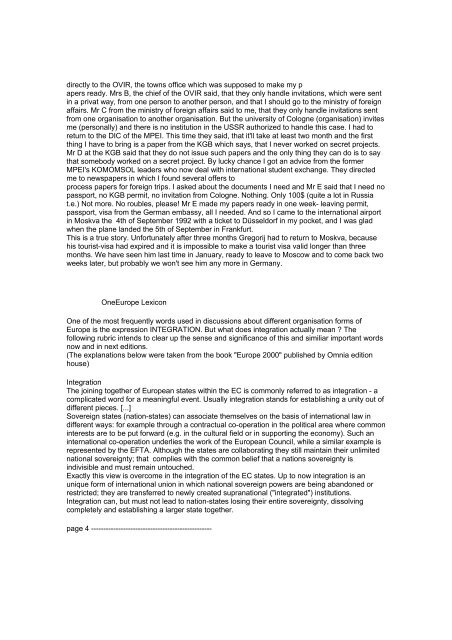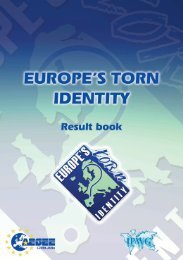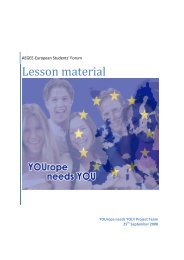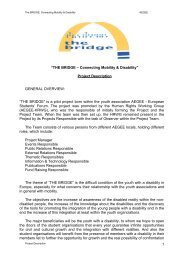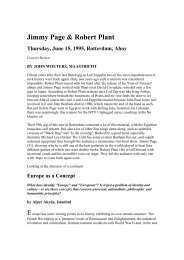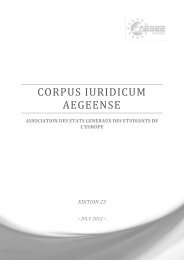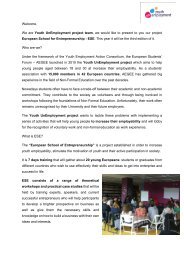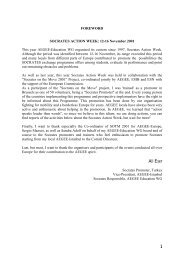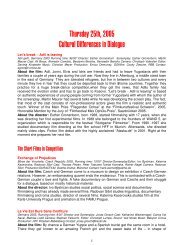OneEurope 1/93 East-West Magazine HOW TO BUILD THE ...
OneEurope 1/93 East-West Magazine HOW TO BUILD THE ...
OneEurope 1/93 East-West Magazine HOW TO BUILD THE ...
Create successful ePaper yourself
Turn your PDF publications into a flip-book with our unique Google optimized e-Paper software.
directly to the OVIR, the towns office which was supposed to make my p<br />
apers ready. Mrs B, the chief of the OVIR said, that they only handle invitations, which were sent<br />
in a privat way, from one person to another person, and that I should go to the ministry of foreign<br />
affairs. Mr C from the ministry of foreign affairs said to me, that they only handle invitations sent<br />
from one organisation to another organisation. But the university of Cologne (organisation) invites<br />
me (personally) and there is no institution in the USSR authorized to handle this case. I had to<br />
return to the DIC of the MPEI. This time they said, that it'll take at least two month and the first<br />
thing I have to bring is a paper from the KGB which says, that I never worked on secret projects.<br />
Mr D at the KGB said that they do not issue such papers and the only thing they can do is to say<br />
that somebody worked on a secret project. By lucky chance I got an advice from the former<br />
MPEI's KOMOMSOL leaders who now deal with international student exchange. They directed<br />
me to newspapers in which I found several offers to<br />
process papers for foreign trips. I asked about the documents I need and Mr E said that I need no<br />
passport, no KGB permit, no invitation from Cologne. Nothing. Only 100$ (quite a lot in Russia<br />
t.e.) Not more. No roubles, please! Mr E made my papers ready in one week- leaving permit,<br />
passport, visa from the German embassy, all I needed. And so I came to the international airport<br />
in Moskva the 4th of September 1992 with a ticket to Düsseldorf in my pocket, and I was glad<br />
when the plane landed the 5th of September in Frankfurt.<br />
This is a true story. Unfortunately after three months Gregorij had to return to Moskva, because<br />
his tourist-visa had expired and it is impossible to make a tourist visa valid longer than three<br />
months. We have seen him last time in January, ready to leave to Moscow and to come back two<br />
weeks later, but probably we won't see him any more in Germany.<br />
<strong>OneEurope</strong> Lexicon<br />
One of the most frequently words used in discussions about different organisation forms of<br />
Europe is the expression INTEGRATION. But what does integration actually mean ? The<br />
following rubric intends to clear up the sense and significance of this and similiar important words<br />
now and in next editions.<br />
(The explanations below were taken from the book "Europe 2000" published by Omnia edition<br />
house)<br />
Integration<br />
The joining together of European states within the EC is commonly referred to as integration - a<br />
complicated word for a meaningful event. Usually integration stands for establishing a unity out of<br />
different pieces. [...]<br />
Sovereign states (nation-states) can associate themselves on the basis of international law in<br />
different ways: for example through a contractual co-operation in the political area where common<br />
interests are to be put forward (e.g. in the cultural field or in supporting the economy). Such an<br />
international co-operation underlies the work of the European Council, while a similar example is<br />
represented by the EFTA. Although the states are collaborating they still maintain their unlimited<br />
national sovereignty; that complies with the common belief that a nations sovereignty is<br />
indivisible and must remain untouched.<br />
Exactly this view is overcome in the integration of the EC states. Up to now integration is an<br />
unique form of international union in which national sovereign powers are being abandoned or<br />
restricted; they are transferred to newly created supranational ("integrated") institutions.<br />
Integration can, but must not lead to nation-states losing their entire sovereignty, dissolving<br />
completely and establishing a larger state together.<br />
page 4 -------------------------------------------------


